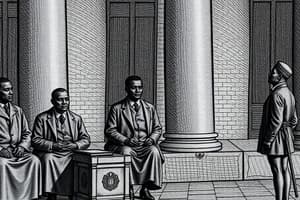Podcast
Questions and Answers
What is the primary focus of legal history?
What is the primary focus of legal history?
Which legal system is known for having a profound impact on European legal traditions?
Which legal system is known for having a profound impact on European legal traditions?
What does the concept of constitutionalism emphasize?
What does the concept of constitutionalism emphasize?
Which document, drafted in 1787, has had significant influence globally?
Which document, drafted in 1787, has had significant influence globally?
Signup and view all the answers
How do amendments to constitutions typically affect governmental structure?
How do amendments to constitutions typically affect governmental structure?
Signup and view all the answers
What role does legal precedent play in the evolution of law?
What role does legal precedent play in the evolution of law?
Signup and view all the answers
What is a key aspect of the relationship between legal history and constitutional history?
What is a key aspect of the relationship between legal history and constitutional history?
Signup and view all the answers
Which historical setting was significant in the early development of written constitutions?
Which historical setting was significant in the early development of written constitutions?
Signup and view all the answers
Study Notes
Legal History
- Legal history encompasses the evolution of legal systems and their principles over time. It examines the development of laws, legal institutions, and judicial procedures.
- Early legal systems often arose from customary practices and religious beliefs. These evolved to codified laws over time.
- Important historical legal systems include Roman law, which had a profound impact on European legal traditions, and common law systems, which developed in England.
- The development of legal history is intertwined with broader social, political, and economic transformations.
- Legal precedent plays a significant role in the evolution of law. Decisions made by judges in previous cases influence future cases.
- Understanding legal history can illuminate current legal issues and illuminate potential solutions for challenges.
Constitutional History
- Constitutional history focuses on the development of constitutions and the evolution of their interpretation.
- Constitutions establish fundamental principles of government, outlining the structure of power and the rights of citizens.
- The concept of constitutionalism emphasizes the rule of law and the limitation of government power.
- Early examples of written constitutions appeared in ancient Greece and Rome, but the modern understanding is largely influenced by the Enlightenment and the emergence of democratic ideals.
- The US Constitution, drafted in 1787, has been influential globally and has undergone significant interpretation over the centuries.
- Historical constitutional developments often involve struggles for power, shifts in social values, and adaptations to changing circumstances.
- Amendments to constitutions are frequently necessary to reflect changing needs and societal values. These modifications can significantly alter the fundamental framework of government.
- Legal precedent and judicial review have shaped and continue to shape the interpretation of constitutional provisions.
- Comparative study of different constitutional histories provides insights into diverse approaches to governance and citizen rights.
- Many countries have adopted written constitutions, influenced by historical precedents and philosophical currents.
Interconnections Between Legal and Constitutional History
- Legal history and constitutional history are closely intertwined. Constitutions are, in a way, frameworks for law, outlining the powers of government and individual protections.
- Changes in legal practices, judicial decisions, and social values often necessitate adjustments and adaptations within constitutional frameworks.
- Constitutional frameworks guide the development and interpretation of specific legal principles.
- The concept of the rule of law, central to both legal and constitutional history, forms their foundation and their underlying principles.
- Understanding the historical development of legal and constitutional principles is crucial for interpreting current legal issues and constitutional challenges.
Studying That Suits You
Use AI to generate personalized quizzes and flashcards to suit your learning preferences.
Description
This quiz explores the evolution of legal systems and constitutional frameworks throughout history. It highlights key developments, significant legal traditions, and the impact of social changes on legal practices. Understanding these elements can provide insights into contemporary legal issues.




